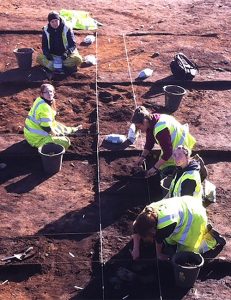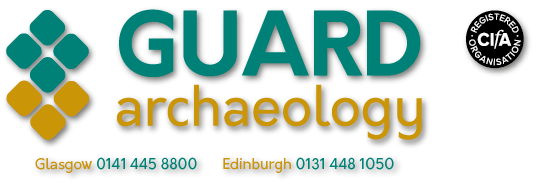
Rhiannon Lanosky MacFarlane (left) and Rebecca Loew (right) now working for GUARD Archaeology Ltd © GUARD Archaeology Ltd
As a Chartered Institute for Archaeologists Registered Organisation we not only take very seriously the training of our own staff, all of whose training needs are assessed via an annual skills audit, personal development plans and a continuing professional development log. But we also take very seriously the training of the next generation of archaeologists and our long-standing relationship with the Department of Archaeology at the University of Glasgow helps make this possible. Our training policy caters for early career archaeologists, volunteers and placement students entering the profession with limited experience and/or skills within the heritage sector (Pathway to PCIfA). Since 2011, we have taken on 9 student placements, several of whom have gone on to find employment with us and other archaeology companies.
‘It was the option of a work placement and research report as opposed to a dissertation that first brought me to the University of Glasgow’, said one of this year’s student placements, Rhiannon Lanosky MacFarlane. ‘I knew that as a student coming from another discipline I did not have the practical experience most others did when coming into the MLitt Material Culture and Artefacts Studies programme. In my seven week placement with GUARD Archaeology I was able to contribute to various ongoing projects acquiring a variety of skills – survey and field walking, evaluation, finds processing and cataloguing, flotation, and artefact illustration, all processes that are necessary when analysing a site. One project stayed with me, and I was fortunate enough that GUARD Archaeology allowed me to use it for my research report. While on placement I had begun cleaning the ceramic assemblage from GUARD Archaeology’s ongoing excavation of Partick Castle in Glasgow. From there I began illustrating the finds, through traditional and digital means. As I became familiar with the assemblage I wondered if it would be possible for me to reconstruct some of the pottery. With the skill sets I learned on placement I was able to build upon that knowledge, teaching myself photogrammetry and 3D animation. Combined with the luck of finding the sherds within the large assemblage, I was able to create a 3D reconstruction of a near complete medieval vessel from Partick Castle.’
‘While I am still learning, I feel this opportunity has given me much more than any classroom could’, added Rhiannon. ‘It gives the student the chance to choose how they learn, and what they want to focus on, whether it be commercial archaeology or in a museum. I came into the placement knowing the direction I wanted to pursue. I did it, and I thoroughly enjoyed it, but now there is so much more that I am interested in.’
Another student at the University of Glasgow’s Material Culture and Artefact Studies programme who took a placement at GUARD Archaeology this summer was Rebecca Loew. Originally from Wisconsin in the USA Rebecca was drawn to the programme precisely because there was an option to participate in a work placement. ‘The GUARD Archaeology staff were welcoming and willing to teach us about all of the different aspects of being an archaeologist’, said Rebecca. ‘The work varied from walkover surveys assessing how future developments might impact sites, to washing and cataloguing artefacts as part of the post-excavation process. We shadowed a member of staff as they went to schools to teach children about local archaeology and shadowed another member of staff during an evaluation, helping to record archaeology as it was being unearthed. I will forever be grateful to GUARD Archaeology for making this such an enjoyable experience and taking the time to teach me more about the profession that I am just starting out in.’
At the heart of GUARD Archaeology’s training policy is a recognition that our staff members and the next generation of archaeologists are central to our success and therefore our success is directly related to the level of investment we make in their futures.
